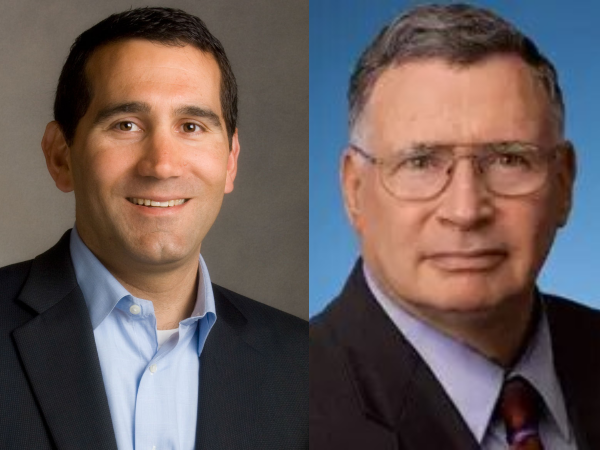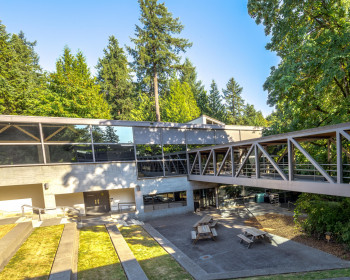Adjunct Professors Sullivan and Litwak reflect on land use careers, extensive teaching experience, and new book
Lewis & Clark Law adjunct professors, Edward Sullivan (Willamette JD ’69) and Jeff Litwak (L&C JD ’97), have taught land use courses at Lewis & Clark Law School for a combined sixty years, and recently issued an online casebook on Oregon land use.
Open gallery

Lewis & Clark Law adjunct professors, Edward Sullivan (Willamette JD ’69) on the right in photo above, and Jeff Litwak (L&C JD ’97) on the left in photo above, have taught land use courses at Lewis & Clark Law School for a combined sixty years, and recently issued an online casebook on Oregon land use.
Sullivan specialized in land use law for over 45 years and is now retired from practice. Before going into private practice, he served as Assistant County Counsel and County Counsel for Washington County, Oregon, and as Legal Counsel to the Governor of Oregon. Over the course of his career, he taught and mentored countless law and land use planning students, as well as published a body of work that aims to explain land use law in Oregon and beyond.
Litwak is Counsel to the Columbia River Gorge Commission, the interstate compact agency responsible for land use policy and planning for the Columbia River Gorge National Scenic Area. He is a frequent speaker on interstate governance arrangements at continuing education programs and a resource that other interstate compact agencies call to help think through thorny problems. He teaches Oregon Land Use and Interstate Compacts at Lewis & Clark.
We asked them for their reflections on their experience teaching at the law school, and their latest casebook.
Ed Sullivan: I’ve been teaching at Lewis & Clark Law School since 1987, beginning with a seminar founded around three ideas: one was to get students to think about and present a local land use case in two teams of two persons each– two persons on the first team would take an applicant’s position and the other team would be the opposition to the application. After one round, there would be an appeal and the applicant’s team would present the opposition’s case on appeal and the opposition would defend the applicant’s position. The position of the teams themselves would also switch, so that one member of the applicant’s original team would be responsible for presenting the written portion of the application, while the other would make the oral presentation, but on appeal, those positions would switch. The other idea was to have lawyers or developers in public and private practice talk about the field and potential for employment therein. A third idea was to have a “live” case before the Oregon Land Use Board of Appeals presented in front of the class. I taught that class until I switched to teaching the substantive land use law class and Jeff took over the seminar and made his own version of familiarization of the practical issues facing land use lawyers.
The other class I taught was the three-credit Planning Law class, which is presented in the Fall Semester every year on a twice-per-week basis. I am an editor of the casebook for that class, in addition to the one Jeff and I put together, and which I also use for my Oregon planning law classes at the College of Planning and Urban Affairs at Portland State University and Willamette University College of Law. I have written and presented frequently on planning law matters and am involved in multiple national and international associations in these and related areas.
Jeff Litwak: I have been the general counsel for the Gorge Commission for more than 23 years now; the work is still fun and interesting, the Commission gives me flexibility to teach and write, and I have never seriously considered leaving. I started as an adjunct at the law school in 2004 teaching Interstate Compact Law and began teaching Oregon Land Use in 2008. My background before law school is land use planning, so Land Use class is extra special to me.
The idea for this book came from my students. In 2020, they told me that they wanted more context for what they were reading in the 100 reading excerpts assigned for the class. Like Ed, this is my second textbook. In 2008, my students in Interstate Compact Law class gave me similar feedback, and in response, I produced a textbook for that class (for which I’m working on the fifth edition), so I knew what the students wanted for Land Use class. And I knew that I wanted to co-author the book with Ed, who is a local, state, national, and international planning legend.
Ed and I both wanted the book to be accessible as a free download for our students, so we chose to post it on SSRN. We also want to be able to easily update the book, which is not possible with a traditional publisher. Although we didn’t intend this as a resource for practitioners, we shared the SSRN link with the Oregon State Bar Real Estate and Land Use Section, and in the first two months, the book was downloaded almost 300 times. That interest by practitioners surprised us.
The students in the Spring 2022 land use class used a draft of portions of the book. Teaching with that draft and the students’ feedback were helpful in finishing the first edition. In this first edition, we focused on the elements of Oregon land use law that we teach, so those subjects have more emphasis than others. We intend to build out the other subjects in future editions.
The book is also an important tool for me to stay current in Oregon land use. It gives me a structure to readily recognize the significance of and catalog new cases, legislation, regulations, and state and local practices and find and fill gaps in the book. By keeping up with developments in the law, I know the students are getting the very latest material and there is less last minute preparation before starting a new semester.
Janice Weis, Associate Dean and Director of the Environmental, Natural Resources, and Energy Law program at Lewis & Clark, reflected on the impact that Ed Sullivan and Jeff Litwak have had on law students and Oregon land use:
“Ed and Jeff have educated and inspired our students regarding every aspect of land use in Oregon. We are especially grateful for the long tenure of these two who have taught on top of other jobs and commitments. Ed holds the record for the longest running adjunct professor in the environmental program and we are very grateful for this commitment. Ed and Jeff’s dedication to passing on their knowledge and wisdom is a gift not only to law students, but also to the State of Oregon.”
Oregon Land Use Law: Cases & Materials is available on SSRN at this link: https://papers.ssrn.com/sol3/papers.cfm?abstract_id=4312216. Ed and Jeff invite you to bookmark the link, check back every year or so for the next edition, and reach out with comments and suggestions for the book.
More Environmental, Natural Resources, & Energy Law Stories
Environmental, Natural Resources, and Energy Law is located in Wood Hall on the Law Campus.
MSC: 51
email elaw@lclark.edu
voice 503-768-6649
Environmental, Natural Resources, and Energy Law
Lewis & Clark Law School
10101 S. Terwilliger Boulevard MSC 51
Portland OR 97219

